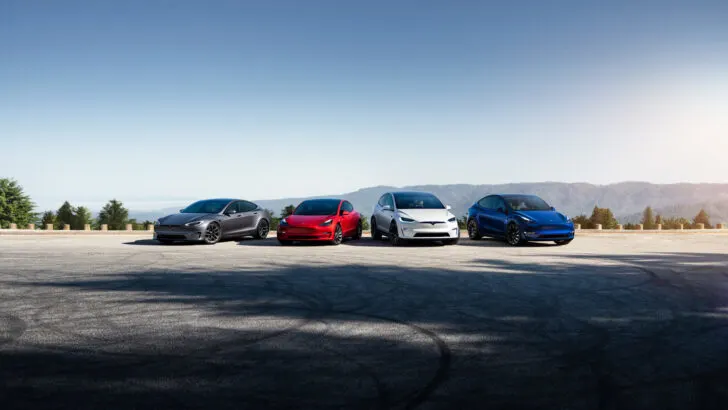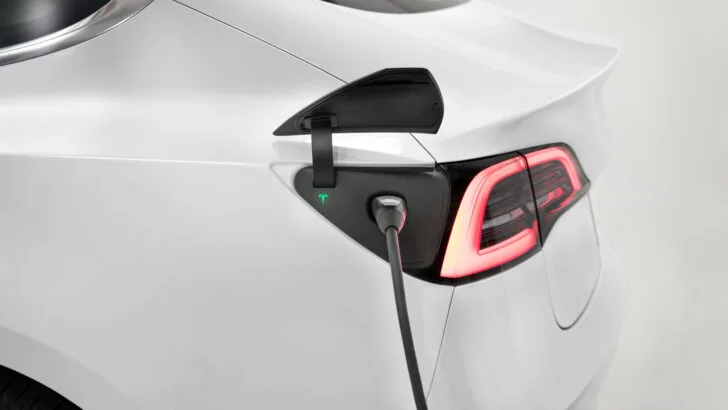The ever-growing public awareness and shift towards environmental sustainability are pushing the sale of electric vehicles more than ever.
One leading company in this race is Tesla. The automobile manufacturer has some of the most sophisticated and powerful EVs, promising excellent reliability, range, and longevity.
No matter where you look, you’ll often find people talking about the brand’s performance, retail price, features, and battery range. However, there’s a shift as EV enthusiasts want to know their Tesla’s weights and how it affects performance and range.
Tesla models have different weights that range from 3,862 lbs (1,751 kgs) to 5390 lbs (2,445 kgs). Moreover, it’s estimated that the Cybertruck will weigh anywhere between 6,500 lbs (2,948 kgs) to 9,000 lbs (4,080 kgs).
In today’s article, we’re looking at the weights of all Tesla models, how they compare to ICE cars, and how they affect performance.
The Curb Weights of All Tesla Models
Tesla Model S
Curb Weight: 4,561 to 4,766 lbs
The Model S’s heavier battery, high-strength steel, and aluminum frames contribute significantly to its curb weight.
The model would have been heavier hadn't Tesla opted to go with the aluminum body frameworks, which reduced its curb weight by 1,100 lbs.
Using fiber composite panels and aluminum alloy rims further reduces the Model S’s weight by nearly 50%.
However, the battery weighs a massive 1,200 lbs (544 kgs) – the second heaviest in the lineup. On the brighter side, you have an option to pick one of your choice between the Standard (95 kWh) and the Plaid (99.3 kWh) batteries.
The bigger battery increases your Tesla’s weight but is necessary to give a better range.
Here’s how the Model S curb weight varies with the trim:
- Standard: 4,561 lbs (2,069 kgs)
- Plaid: 4,766 lbs (2,162 kgs)
Tesla Model 3
Curb Weight: 3,862 to 4,048 lbs
The Model 3 compact sedan is Tesla’s lightest and cheapest car in the lineup. It has excellent performance, safety, and comfort, making it suitable for smaller families.
Also, its shorter dimensions mean the car has the smallest battery in the Tesla lineup.
The Model 3 has a lighter nickel-based battery weighing 1,060 pounds (480.8 kgs) and a high-strength steel and aluminum frame. In comparison, its battery is 15% lighter than a Model S’s battery.
FYI, the battery constitutes the highest percentage of any electric vehicle’s weight, meaning that the heavier the battery, the heavier the car.
The light chassis and batteries contribute to the following Model 3 curb weights:
- Rear-Wheel Drive: 3,862 lbs (1,751 kgs)
- Long Range AWD: 4,034 lbs (1,830 kgs)
- Performance: 4,048 lbs (1,836 kgs)
Tesla Model Y
Curb Weight: 4,363 to 4,398 lbs
The Tesla Model Y is a family-oriented car with a seating of 7 people. For its size, the model has high-strength steel and aluminum body that significantly reduces its curb weight.
Additionally, its low center of gravity, large crumple zones, and rigid body structure ensure that it is the safest Tesla car currently in production.
Here’s how the Model Y trim curb weights compare:
- Long Range AWD: 4,363 lbs (1,979 kgs)
- Performance: 4,398 lbs (1,995 kgs)
Tesla Model X
Curb Weight: 5,185 to 5,390 lbs
The luxurious Model X mid-size SUV is relatively heavier than the other models owing to a heavier higher-strength steel frame and aluminum body.
Despite speculations that it might be too heavy, the good news is that the model falls under the 6,000 lbs range and is lighter than the Mercedes EQV (5,800 lbs).
Once again, the battery is a significant weight contributor adding 1,200 lbs. But it is necessary for the EV’s performance.
The car has a best-in-class torque enough to tow up to 5,000 lbs (2,267 kgs) and is the only Tesla equipped with a towing mechanism.
Here’s a look at the curb weights of Model Y variants:
- Standard: 5,185 lbs (2,351 kgs)
- Plaid: 5,390 lbs (2,445 kgs)

How Much Does a Tesla Weight Compared to a Regular Car?
An average mid-size sedan weighs 3,351 pounds – a weight which is 660 pounds more than an average car!
In contrast, all Teslas weigh more than the average, clocking in at a minimum of 3,862 pounds.
In fact, the average car weighs in at 3,000 lbs (1,360 kgs) while Tesla’s average curb weight is 4,602 lbs (2,087 kgs).
That’s a 53% increase in average weight across all models!
Why Are Teslas So Heavy?
Heavy Battery Packs
From physics, we know that the greater the load, the more energy a system has to expend to result in motion. In other words, you’ll use more energy lifting a 30 lb concrete slab than you would with a piece of paper.
If you look at internal combustion engine (ICE) cars, the bigger the engine results in more torque, meaning the car will be stronger. In contrast, EVs don’t have ICEs but rely on high-density batteries to run electric motors, which are power intensive.
Tesla’s battery packs account for a significant percentage of the car’s weight.
Charging Hardware
Tesla electric vehicles rely on high-quality power converters, charging ports, and onboard computers to work well.
To a smaller extent, this charging hardware contributes to the car's weight.
However, some may argue that these are just a replacement for gas tanks and exhaust systems in fossil-fuel-powered cars.

How Can You Reduce a Tesla’s Weight?
There isn’t much you can do to reduce your Tesla’s curb weight, but there are a lot of ways to lower its gross vehicle weight rating (GVWR). The GVWR is the weight of the car, its passengers, and any present cargo.
From this definition, the only variables are the number of passengers in the car and the cargo present, whereas the curb weight is constant.
So, here are some measures you can adopt to reduce your Tesla’s weight and improve its range.
- Avoid carrying unnecessary luggage
- Avoid any modifications or decorations that add significant weight to your Tesla
- Remove any unnecessary roof racks
- Carry the recommended number of passengers at all times
- Never tow with any Tesla that isn’t equipped with a towing mechanism
Pros and Cons of Tesla’s Weight
Like any vehicle, your Tesla’s curb weight has advantages and disadvantages. However, the cons outweigh the pros, and Tesla is investing a lot of resources in research and development to come up with lighter battery packs and chassis.
Here are the pros and cons of Tesla’s curb weights.
Pros
5-Star Safety: A vehicle’s weight is only beneficial up to a certain point. Any additional weight beyond this threshold is detrimental to its powertrain, negatively affecting its performance.
Conversely, a heavier car is much safer, and its occupants have a higher survival chance if it collides with a lighter one.
Better ride quality: Tesla EVs have well-designed frames and suspensions that soak up road imperfections better than the lighter ICE cars of the same class.
Cons
Tire wear: EVs, in general, wear out tires 30% quicker than ICE vehicles. The reason is that there’s high torque available to the tires at any given time due to the weights and high-performance nature of Tesla cars.
Higher power consumption: The heavier a Tesla is, the more power it needs to cover a specific distance. If all Teslas had the same-capacity battery packs, the lightest would have the best range.
Final Thoughts on How Heavy Teslas Are
Teslas are excellent EVs that hold their value longer than most ICE cars.
They benefit from the constant over-the-air updates, their 5-start safety ratings, and have best-in-class ranges.
And as Teslas are heavier than most cars in their classes, they’re actually lighter than equally-rated EVs from other manufacturers. And as time progresses, we’ll get lighter Teslas with more range at lower prices.
Sources
https://edition.cnn.com/2021/06/07/business/electric-vehicles-weight/index.html
https://getjerry.com/questions/how-much-does-a-tesla-weigh
https://www.quora.com/What-is-the-benefit-of-more-curb-weight-in-a-car
https://www.quora.com/Is-a-Tesla-heavier-than-an-ICE-car-of-equal-size
